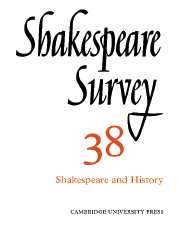Book contents
- Frontmatter
- Shakespeare’s History Plays: 1952–1983
- Shakespeare and History: Divergencies and Agreements
- Shakespeare’s Georgic Histories
- The Nature of Topicality in Love’s Labour’s Lost
- The Tragic Substructure of the Henry IV Plays
- Hal and the Regent
- The Rite of Violence in I Henry IV
- The Fortunes of Oldcastle
- Hand D in Sir Thomas More: An Essay in Misinterpretation
- Livy, Machiavelli, and Shakespeare’s Coriolanus
- Henry VIII and the Ideal England
- The Strangeness of a Dramatic Style: Rumour in Henry VIII
- ‘Edgar I Nothing Am’: Figurenposition in King Lear
- ‘Very like a whale’: Scepticism and Seeing in The Tempest
- Shakespeare’s Medical Imagination
- Shakespeare in the Theatrical Criticism of Henry Morley
- Shakespeare Performances in Stratford-upon-Avon and London 1983–4
- The Year's Contributions to Shakespearian Study 1 Critical Studies
- 2 Shakespeare’s Life, Times and Stage
- 3 Editions and Textual Studies
- Index
The Fortunes of Oldcastle
Published online by Cambridge University Press: 28 March 2007
- Frontmatter
- Shakespeare’s History Plays: 1952–1983
- Shakespeare and History: Divergencies and Agreements
- Shakespeare’s Georgic Histories
- The Nature of Topicality in Love’s Labour’s Lost
- The Tragic Substructure of the Henry IV Plays
- Hal and the Regent
- The Rite of Violence in I Henry IV
- The Fortunes of Oldcastle
- Hand D in Sir Thomas More: An Essay in Misinterpretation
- Livy, Machiavelli, and Shakespeare’s Coriolanus
- Henry VIII and the Ideal England
- The Strangeness of a Dramatic Style: Rumour in Henry VIII
- ‘Edgar I Nothing Am’: Figurenposition in King Lear
- ‘Very like a whale’: Scepticism and Seeing in The Tempest
- Shakespeare’s Medical Imagination
- Shakespeare in the Theatrical Criticism of Henry Morley
- Shakespeare Performances in Stratford-upon-Avon and London 1983–4
- The Year's Contributions to Shakespearian Study 1 Critical Studies
- 2 Shakespeare’s Life, Times and Stage
- 3 Editions and Textual Studies
- Index
Summary
All Shakespeare’s plays were subjected to political censorship. Every play had to be licensed before it could be performed or published; even after that, it could get its author or actors into trouble, if objection was subsequently taken to its performance. Editors recognize these facts, and can sometimes retrospectively save a writer from the censor. When a play survives in an early quarto, set from Shakespeare’s own draft, we can sometimes restore material excised in the First Folio. When a Jacobean text of an Elizabethan play shows little or no sign of authorial revision, but does omit an insulting reference to the Scots, it seems reasonable enough to infer that the change was made because the sensibility of William Shakespeare had in this instance to bow to that of James Stuart. We infer that the text has been censored, and we act on that inference. But in one play we can do more than ‘infer’ that political interference has occurred. In one case we possess abundant contemporary evidence that the text was changed, we know what Shakespeare originally wrote, what his company originally performed, and that political pressure was applied in order to force him to alter his text. Nevertheless, no editor has ever restored the original reading – despite the fact that in this case the censor’s intervention makes more difference to the meaning of the play than in any other known or suspected instance.
- Type
- Chapter
- Information
- Shakespeare Survey , pp. 85 - 100Publisher: Cambridge University PressPrint publication year: 1986

